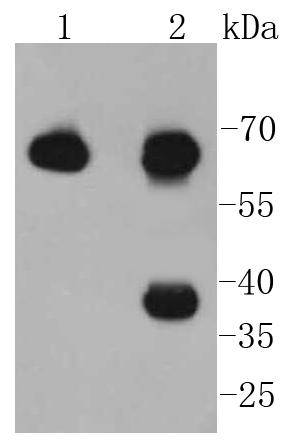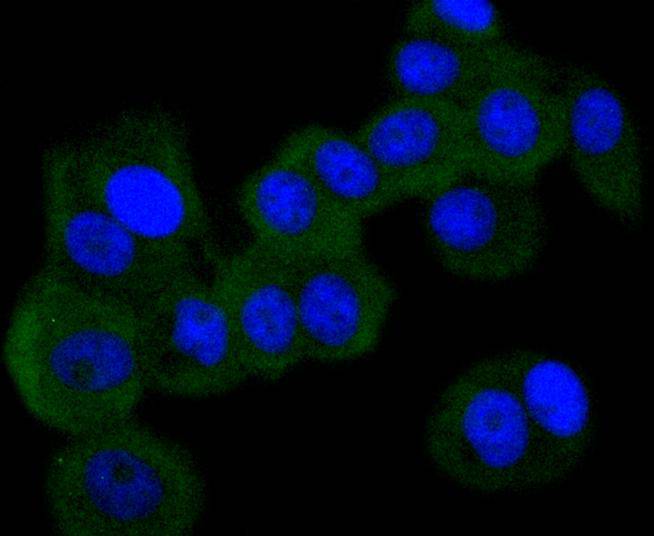Product Name :
PKR polyclonal antibody Background :
An interferon-inducible, RNA-dependent protein serine/threonine kinase (PKR) has been described. PKR in earlier literature is variously known as DAI, dsJ, PI kinase, p65, p67 or TIK for the mouse kinase; and p68 or p69 for the human kinase. The PKR kinase substrate is the a subunit of protein synthesis initiation factor eIF-2. Phosphorylation of eIF-2a on serine-51 results in inhibition of translation. Molecular cDNA clones have been isolated from both human and mouse cells. The serine/threonine kinase catalytic domains map to the carboxy terminal half of the protein while the RNA-binding domains are located in the amino terminal region. Three kinds of regulation of PKR enzymatic activity have been described. These include transcriptional regulation in response to interferon, an autoregulatory mechanism controlling PKR expression at the level of translation and post-translational regulation by RNA mediated autophosphorylation. Product :
Rabbit IgG, 1mg/ml in PBS with 0.02% sodium azide, 50% glycerol, pH7.2 Storage&Stability :
Store at +4°C after thawing. Aliquot store at -20°C or -80°C. Avoid repeated freeze / thaw cycles. Specificity :
PKR polyclonal antibody detects endogenous levels of PKR protein. Immunogen :
recombinant protein Conjugate :
Unconjugated Modification :
Unmodification
PKR polyclonal antibody Background :
An interferon-inducible, RNA-dependent protein serine/threonine kinase (PKR) has been described. PKR in earlier literature is variously known as DAI, dsJ, PI kinase, p65, p67 or TIK for the mouse kinase; and p68 or p69 for the human kinase. The PKR kinase substrate is the a subunit of protein synthesis initiation factor eIF-2. Phosphorylation of eIF-2a on serine-51 results in inhibition of translation. Molecular cDNA clones have been isolated from both human and mouse cells. The serine/threonine kinase catalytic domains map to the carboxy terminal half of the protein while the RNA-binding domains are located in the amino terminal region. Three kinds of regulation of PKR enzymatic activity have been described. These include transcriptional regulation in response to interferon, an autoregulatory mechanism controlling PKR expression at the level of translation and post-translational regulation by RNA mediated autophosphorylation. Product :
Rabbit IgG, 1mg/ml in PBS with 0.02% sodium azide, 50% glycerol, pH7.2 Storage&Stability :
Store at +4°C after thawing. Aliquot store at -20°C or -80°C. Avoid repeated freeze / thaw cycles. Specificity :
PKR polyclonal antibody detects endogenous levels of PKR protein. Immunogen :
recombinant protein Conjugate :
Unconjugated Modification :
Unmodification
-
 Western blot analysis of PKR on different lysates using anti-PKR antibody at 1/1,000 dilution. Positive control: Lane 1: MCF-7 Lane 2: Hela
Western blot analysis of PKR on different lysates using anti-PKR antibody at 1/1,000 dilution. Positive control: Lane 1: MCF-7 Lane 2: Hela -
 ICC staining PKR in MCF-7 cells (green). The nuclear counter stain is DAPI (blue). Cells were fixed in paraformaldehyde, permeabilised with 0.25% Triton X100/PBS.
ICC staining PKR in MCF-7 cells (green). The nuclear counter stain is DAPI (blue). Cells were fixed in paraformaldehyde, permeabilised with 0.25% Triton X100/PBS.
Bioworld Biotech only provide peptides for our antibodies and do not provide additional peptide customization services.
Price/Size :
USD 368/1mg/vial
Tips:
For phospho antibody, we provide phospho peptide(0.5mg) and non-phospho peptide(0.5mg).Describe :
Blocking peptides are peptides that bind specifically to the target antibody and block antibody binding. These peptide usually contains the epitope recognized by the antibody. Antibodies bound to the blocking peptide no longer bind to the epitope on the target protein. This mechanism is useful when non-specific binding is an issue, for example, in Western blotting (WB) and Immunohistochemistry (IHC). By comparing the staining from the blocked antibody versus the antibody alone, one can see which staining is specific; Specific binding will be absent from the western blot or IHC performed with the neutralized antibody.Formula:
Synthetic peptide was lyophilized with 100% acetonitrile and is supplied as a powder. Reconstitute with 0.1 ml DI water for a final concentration of 10 mg/ml.The purity is >90%,tested by HPLC and MS.
Storage:
The freeze-dried powder is more stable. For short time at 2-8°C. For long term storage store at -20°C.
Note :
This product is for research use only (RUO only). Not for use in diagnostic or therapeutic procedures.
 PKR polyclonal antibody
PKR polyclonal antibody  Datasheet
Datasheet COA
COA MSDS
MSDS SHIP
SHIP